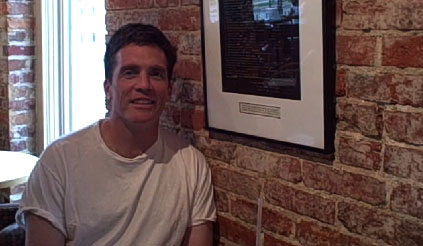Louis Bayard’s Secret History of Crime Fiction

In the last five years, since the publication of Mr. Timothy, Louis Bayard has become one of our leading authors of historical thrillers—but, he told me when we met in Washington, D.C., last month, “It’s not a niche I ever defined for myself. I just walked right into it.” After writing two contemporary gay romantic comedies in the 1990s, he had a literary itch that he simply couldn’t resist scratching: “All I know is that I wanted to write about Tiny Tim, and I wanted to do bad things to him.” After the success of that book, Bayard turned to one of crime fiction’s founding fathers, Edgar Allen Poe, for The Pale Blue Eye, and now, in The Black Tower, he has turned to Eugène François Vidocq, who rose to prominence as one of post-revolutionary France’s first criminal investigators.
“I was toiling through an idea for a novel about Franz Mesmer that wasn’t going where I wanted it to,” Bayard explained, when his editor at William Morrow, Marjorie Braman (who has since become the editor in chief at Henry Holt), suggested Vidocq, a name that Bayard had first encountered during the research for The Pale Blue Eye—he’d been curious that Vidocq was apparently so familiar to 19th-century readers that his name could be dropped without any explanation. “The more I learned about him, the more he intrigued me,” Bayard continued, until he decided Vidocq “should be put in the genre he helped create.”
Vidocq’s memoirs, he explained, could be considered the first detective novel, but as the story of The Black Tower took shape, instead of being told in Vidocq’s voice, a Watson-like character named Hector Carpentier quickly became the narrator. “It’s the same feeling I had with Poe [in The Pale Blue Eye],” Bayard said. “You almost have to observe Vidocq through a surrogate.” Unlike the protagonists of his earlier crime novels, Vidocq is largely unknown to American readers—which is part of the challenge that Bayard set for himself in writing the book, along with his first use of dual timelines to slowly reveal the plot. “There has to be a possibility of failing for me to get excited about doing it,” he said.
That’s one reason, he continued, he’s not likely to ever write a direct sequel to one of his novels, or start writing a series. “I can see the attraction, because you don’t need to do all the research all over again,” he observed, as we joked about Tiny Tim barreling his way through the Dickens universe. “Vidocq’s the one character I could see doing it with,” he added, “but not enough that I’m actually going to do it.” Instead, for his next project, he’s looking at the cluster of Elizabethan-era figures known as the School of Night, a group that included Walter Raleigh and Christopher Marlowe. But, he warns, just as he changed gears to write Mr. Timothy, he’d be “just as surprised if I was doing this in ten years.” That might disappoint some fans down the line, but I’m sure I’m not the only one who will be curious enough to follow if and when he takes that turn.
20 October 2008 | interviews |

 Our Endless and Proper Work is my new book with Belt Publishing about starting (and sticking to) a productive writing practice.
Our Endless and Proper Work is my new book with Belt Publishing about starting (and sticking to) a productive writing practice. 
